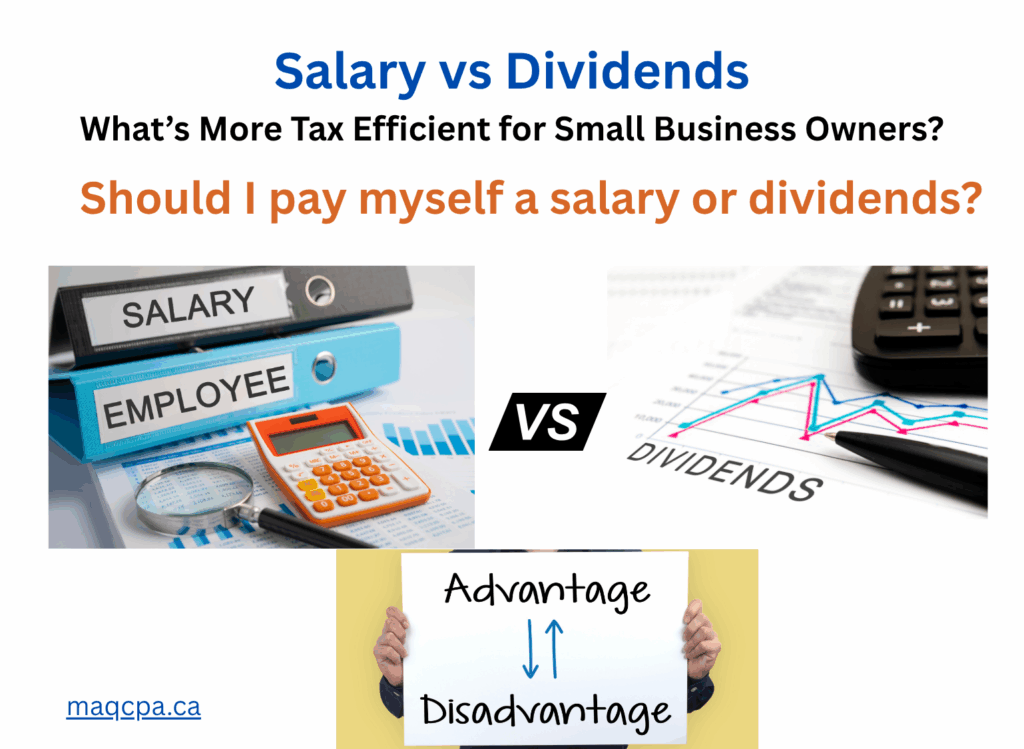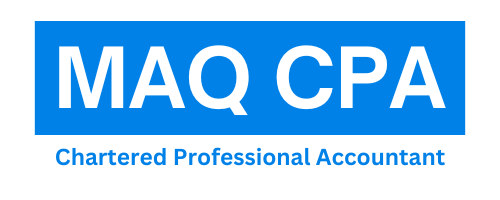If you’re an incorporated small business owner in Toronto or anywhere across the GTHA and Canada, you’ve probably asked yourself: Should I pay myself a salary vs dividends?
This is one of the most common — and misunderstood — tax planning questions for entrepreneurs, consultants, and professionals with corporations. And the answer? It depends.
Choosing between salary and dividends (or a combination of both) has big implications for:
- Your personal tax burden
- RRSP and CPP eligibility
- Corporate cash flow
- Your ability to qualify for a mortgage or loan
A growing number of incorporated business owners are using blended strategies to stay compliant, reduce taxes, and increase flexibility.
In this guide, we’ll explain the pros, cons, and tax efficiency of salary vs dividends — in plain language — so you can make an informed decision that fits your financial and business goals.

Key Takeaways
- Salary is deductible for your corporation and creates RRSP room and CPP contributions.
- Dividends are taxed at a lower personal rate but aren’t deductible and don’t create RRSP or CPP.
- The best option depends on your income, retirement plan, and cash flow.
- Most small business owners benefit from a blended salary/dividend strategy.
- Personalized advice from a CPA is crucial — especially for incorporated professionals in Ontario.
Salary: Benefits and Drawbacks
✅ Why Pay Yourself a Salary?
Paying a salary means issuing yourself a T4 and registering for payroll. Here are the main advantages:
- Tax-deductible to your corporation
Salary is an expense, which lowers your corporate taxable income. - Creates RRSP contribution room
CRA allows you to contribute up to 18% of earned income to an RRSP each year (up to a cap). Only salary — not dividends — counts. [CRA RRSP limits] - Builds CPP entitlement
You and your corporation contribute to the Canada Pension Plan. While this costs more up front, it increases your retirement benefits later. - Helps qualify for loans or mortgages
Lenders prefer T4 income when assessing stability.
❌ Downsides of Paying a Salary
- You (and your corp) pay CPP
Combined CPP costs can exceed $7,000 annually. - Payroll setup required
You’ll need to remit withholdings, issue T4s, and meet deadlines. - Higher personal tax on salary
Ontario’s top marginal rate for salary is over 53% — although most small business owners fall into the middle brackets.
Dividends: Advantages and Limitations
Dividends are paid from after-tax corporate profits and reported on a T5.
✅ Why Choose Dividends?
- Lower personal tax rates
Eligible dividends benefit from the dividend tax credit, reducing your personal tax payable. - No CPP or payroll contributions
This can save thousands each year in payroll costs. - Simple to administer
No payroll registration or remittances. Just declare dividends through a corporate resolution and issue a T5. - Greater timing flexibility
You can declare dividends at year-end based on cash flow and earnings.
❌ Risks and Limitations of Dividends
- Not tax-deductible to the corporation
Dividends are paid from after-tax income, so they don’t reduce your company’s tax bill. - No RRSP room or CPP contributions
Can lead to a retirement savings shortfall. - TOSI (Tax on Split Income) limitations
Since 2018, you can’t automatically split dividends with family members unless they meet specific conditions. [CRA TOSI]
Salary vs Dividends: Tax Efficiency Comparison Table
| Factor | Salary | Dividends |
| Deductible to Corporation | ✅ Yes | ❌ No |
| CPP Contributions | ✅ Required | ❌ Not applicable |
| RRSP Contribution Room | ✅ Generated | ❌ Not generated |
| Personal Tax Rate | 🔺 Higher | 🔻 Lower (with tax credit) |
| Cash Flow Flexibility | ❌ Less | ✅ More flexible |
| Mortgage/Lender Preference | ✅ Preferred | ❌ Less reliable income |
| Admin Complexity | 🔺 Higher (payroll setup) | 🔻 Lower (T5 only) |
Real-Life Scenarios: Salary vs Dividends
👨⚕️ Professional Corporation Owner in Toronto
Dr. C runs a dental practice in North York. She wants to maximize RRSP contributions and qualify for a mortgage.
Probable strategy: Salary up to RRSP max + dividends for flexibility.
💼 Tech Consultant in Markham
Mr. A is a freelance software developer with $125K annual income. He wants simplicity and doesn’t need an RRSP room.
Probable strategy: Mostly dividends with minimal or no salary.
👩🍳 Restaurant Owner in Scarborough
Ms. M owns an incorporated cafe. She needs consistent income but wants to reduce payroll costs.
Probable strategy: Mix of salary and dividends, adjusted quarterly based on profitability.
Strategic Questions to Ask Your CPA
Before deciding how to compensate yourself, bring these questions to your tax advisor:
- Should I pay myself up to the CPP max or beyond?
- Do I need an RRSP room this year?
- What are the TOSI rules for my spouse or adult children?
- How can I minimize both personal and corporate tax?
- What are the legal and CRA-compliant ways to structure a blend?
FAQ – Tax Accountants Toronto / Scarborough / Markham / Ajax / Mississauga
Is it better to pay myself a salary vs dividends?
It depends on your goals. Salary gives RRSP and CPP benefits, while dividends are often taxed lower personally. A hybrid approach is typically best.
Do dividends create RRSP contribution room?
No. Only earned income from salary (or self-employment) generates RRSP room.
Can I pay myself a salary vs dividends?
Yes — and many CPAs recommend doing both. The balance depends on your corporate profits, personal tax bracket, and long-term planning needs.
Do I pay CPP on dividends?
No. CPP applies only to salary or wages.
Can I switch from salary to dividends mid-year?
Yes, but it must be carefully documented and planned. Your accountant can help structure it.
Final Thoughts
There’s no one-size-fits-all answer to salary vs dividends — especially in Canada’s complex tax environment. The best choice depends on:
- Your income level
- Retirement savings strategy
- Cash flow needs
- Mortgage plans
- And your corporation’s profitability
For small business owners across Toronto, Scarborough, Markham, Ajax, Oshawa, Whitby, Mississauga and beyond, the smartest move is to build a compensation strategy that balances salary and dividends — not just for tax efficiency, but for long-term wealth.
✅ Ready to find the right mix for your corporation?
Speak with our Toronto-based CPA firm today and get a personalized tax plan tailored to your business and life goals.
📞 Book a Consultation with MAQ CPA’s corporate tax accountant Scarborough
📚 Explore Our Small Business Corporate Tax Services
Disclaimer
The information provided in this blog is for general informational purposes only and does not constitute professional accounting, tax, financial, or legal advice. While we strive to ensure the accuracy and timeliness of the content, the information may not apply to your specific situation or reflect the most current legislative changes. Readers are strongly advised to consult a qualified professional before making any decisions based on the content of this blog. MAQ CPA and its representatives disclaim any liability for any loss or damage incurred as a result of reliance on any information provided herein.
